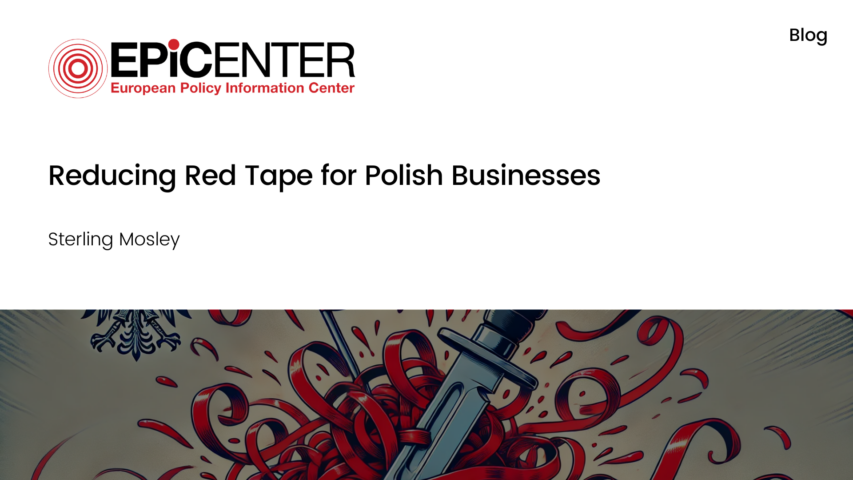Reducing Red Tape for Polish Businesses

Reducing Red Tape for Polish Businesses
Sterling Mosley // 22 July 2022
The standard of living crisis has been exacerbated by rising inflation and regulatory costs that have increased prices for the average consumer. As of June 2022, the Polish inflation rate had reached 15.6%. Deregulation and bureaucratic concentration present two ways of alleviating consumer prices in the long run by increasing market competition, simplifying the process of setting up businesses in the country, and fostering an environment that is friendly to entrepreneurs. Improving ease of doing business within the Polish economy would reduce consumer prices in the medium term, which can help stabilise inflation and lower the relative cost of living.
Compared to other European nations, it takes relatively longer to set up a business in Poland – approximately 37 days. other European nations, it takes a week or less. For example, in Germany and Slovenia, it takes eight days to set up a business, while in Greece it takes only four days. In Poland, this process takes longer primarily due to the time taken to file for company registration at the National Court Register, which takes around four weeks, and the registration for taxes and VAT, which takes approximately seven days. The National Court Register offers online registration, but it is not utilised by most firms as the system provides a very simple template for articles of association that allows only limited modifications.
The long registration process creates a less-friendly business environment in Poland, thus dissuading companies and entrepreneurs from setting up here compared to other EU countries. Poland has one of the lowest new business density scores in Europe at 1.6 per 1,000 citizens compared to Czechia (3.8 per 1,000), France (5.3 per 1,000), and the Netherlands (3.1 per 1,000). Deregulating the registration process and streamlining bureaucratic pathways can help shorten the month-long wait to register a new enterprise and subsequently improve the ease of doing business in the long term.
When compared to other European countries, the Polish registration system is highly centralised. This centralisation leads to the over-bureaucratisation as the National Court Register is mandated to share registration data with other agencies such as the Central Register of Excise Entities and the National Revenue Administration, which likely causes delays in processing.
In the Netherlands, for example, company registrations are handled by local Chamber of Commerce offices in-person or online. This localised system is more efficient than going through a centralised branch of the Netherlands Chamber of Commerce in Amsterdam. Additionally, VAT registration can be done simultaneously without sending the registration information to a centralised bureaucracy. This system has made the Netherlands one of the countries with the fastest company registration process in the EU, taking just three and a half days.
Poland could consider localis its registration system. This would shrink the jurisdiction of the Polish national government and ensure that the registration process for new companies and entrepreneurs is streamlined and more efficient. This restructuring would encourage entrepreneurship within the Polish economy; and in the long term, it would increase economic growth and decrease consumer prices via the expansion of market competition.
Another potential route to reducing company registration times, currently used in France, is to integrate national bureaucracies. A company wishing to incorporate in France can do so via the Centre de Formalités des Entreprises (CFE). This agency governs all aspects related to private enterprises, including the commercial registry, statistics, taxation, social security, labour, health insurance, unemployment insurance, pensions, employment services, and other bodies. Additionally, the CFE automatically enters the registration data, rather than sending it to another agency, into the National Enterprise Registry. This bureaucratic concentration allows companies to incorporate in only four days.
A reorganisation of the Polish national bureaucracy could help streamline this time-consuming process. Since Poland entered the European Union in 2004, the incorporation process has gradually become less burdensome. For example, in 2003 it took 63 days for a company to complete its registration. To attract more businesses to Poland, and to increase market competition and eventually lower prices, the government should consider streamlining its company incorporation processes using time-saving alternatives. Reducing the bureaucratic burden would allow businesses and entrepreneurs to become more productive, begin operations sooner, and spend less capital upfront. Simplifying the company registration process will lead to increased economic activity, thus lowering consumer prices via market competition and alleviating the impacts of inflation. With Poland being the second-most complex economy in the EU to conduct business in, improving the incorporation process would be a step in the right direction. In a time of unprecedented inflation, alleviating barriers of entry for businesses will create greater market competition, eventually culminating in lower prices for consumers in the Central European nation.
EPICENTER publications and contributions from our member think tanks are designed to promote the discussion of economic issues and the role of markets in solving economic and social problems. As with all EPICENTER publications, the views expressed here are those of the author and not EPICENTER or its member think tanks (which have no corporate view).



